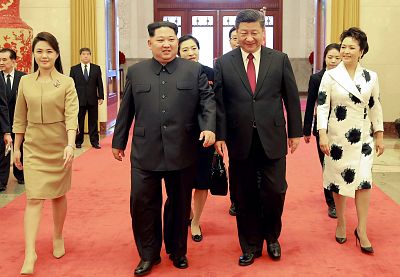"If Kim is as shrewd as appears to be, he probably recognizes that in some ways the momentum is with him — Trump is on the ropes," one expert said.
It can often feel like the future of North Korea and its nuclear arsenal revolves around President Donald Trump and his personal relationship with Kim Jong Un.
But another player in this diplomatic puzzle is China, which is involved in more than 90 percent of North Korean trade and is considered Pyongyang's only major ally.
World News
On Tuesday, Kim arrived in Beijing in a luxury, armor-plated train for his fourth summit with Chinese President Xi Jinping.
The trip began on Kim's birthday — Chinese state media said he turned 35 — but his visit has greater significance than blowing out a few candles.
This appears to be following a pattern set last year, when Kim's meetings with the Chinese president directly preceded historic summits with Trump and South Korean President Moon Jae-in.
This time, it comes ahead of an expected second summit between Trump and Kim that is likely to take place in the next month or two.
The fanfare surrounding this week is likely not accidental, according to John Nilsson-Wright, a senior research fellow at Chatham House, a London think tank.
"Kim is probably using that as a way of indirectly signaling to Donald Trump that he has other options, that the U.S.-North Korea relationship is not the only game in town," he said.
Gao, the vice-chairman of the Beijing-based Center for China and Globalization think tank, said Kim "wants to be in a situation where he can engage with President Trump as an equal and he will not be outsmarted by the United States."
By meeting with Xi, Kim strengthens his hand going into the negotiations with Trump, said Gao, who served as interpreter to former Chinese leader Deng Xiaoping during the 1980s.
Building "trust and confidence with China ... is very much of a strategic importance" to North Korea, Gao said, "because they can demonstrate to President Trump and the United States that they actually have the backing of China."
Though symbolic, Trump's summit with Kim last year was widely criticized for being vague on detail. The agreement they signed to "work toward complete denuclearization of the Korean Peninsula" did not define what "denuclearization" meant nor say how it might be achieved.
Negotiations since then between Washington and Pyongyang have gained little ground. Ultimately, many experts and officials are skeptical whether Kim will ever grant Trump's wish of complete, verified denuclearization. Nuclear weapons are his family's only real insurance policy.
In the past year, North Korea has halted nuclear and missile tests, but it refuses to give any more ground on dismantling its weapons program until the U.S. starts repealing sanctions that are throttling its stunted economy.
#embed-20181227-north-korea-launches-and-bombs iframe {width: 1px;min-width: 100%}
That desire to expand the economy was a central theme in Kim's New Year address last week. One potential key to easing this pressure is China — North Korea's only major trading partner.
Turning away from the U.S. and toward China was one interpretation of perhaps the most interesting line in Kim's speech last week. His threat to seek a "new way" to find peace on the Korean Peninsula was taken by some not as a threat to return to nuclear testing, but as a warning to Washington that it has other options.
Kim's Beijing visit was initially billed as ending Thursday but reports suggested he in fact left a day earlier than that. Few details have been released about the trip, which also included his wife, Ri Sol Ju, and other senior officials.
The young dictator arrives in Beijing at a time of delicate relations between his hosts and Washington.
A day before his locomotive rolled into town, a U.S. delegation arrived hoping to ease a multibillion-dollar trade war with China.
Another source of aggravation was exposed Monday when the U.S. further angered Beijing by sailing a warship through disputed waters in the South China Sea.
By visiting this week, not only is Kim likely sending a message to Washington by visiting Beijing, but he may be trying to exploit the Trump-Xi rift, many experts say.
Persuading Beijing to break with Trump's "maximum pressure" sanctions policy could be one way to ease the economic pain on Pyongyang.
For Kim, now might be a good time to try.
Trump is facing challenges at home with the partial government shutdown over his border wall, as well as abroad with the controversial decision to pull out of Syria and the subsequent departure of Defense Secretary James Mattis.
It's unclear what Trump can achieve at a second summit, given the gridlock that followed the first. North Korea might hope to inspire an impulsive concession from him, like last year when Trump offered to halt military exercises with South Korea, a move that appeared to blindside his own military.
"If Kim is as shrewd as appears to be, he probably recognizes that in some ways the momentum is with him — Trump is on the ropes," Nilsson-Wright said. "So meeting Xi now is clever timing, I think, on Kim's part."












